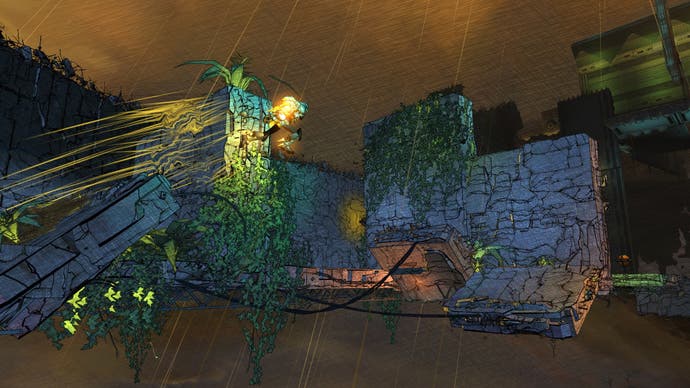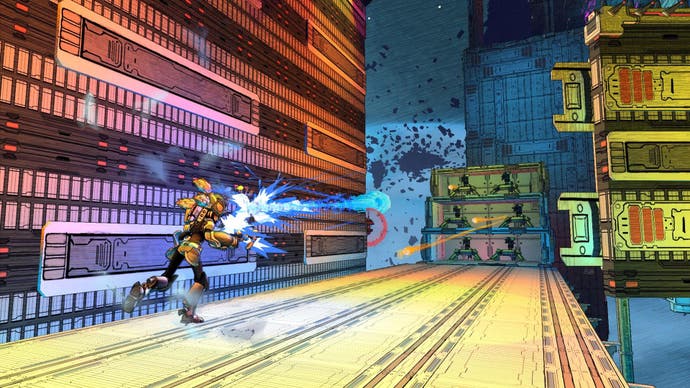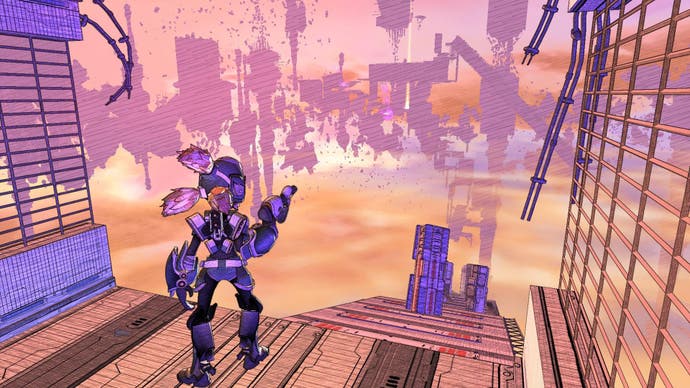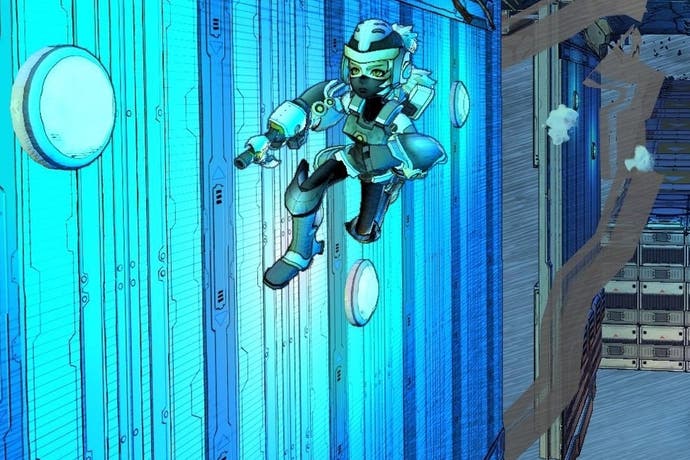Cloudbuilt review
Castles in the sky.
One of the core tenets of free running is that there is an artistry in simple movement; it holds unimpeded momentum to be one of the most beautiful things in the world. A growing crop of games has sought to co-opt this idea for their own purposes - be it more open levels, a sense of empowerment or simple fun. Cloudbuilt takes that idea and uses it to tell a story, frequently nailing the connection between metaphor, message and play.
The set-up for this surreal action-platformer is just as unusual as its special cocktail of triumph and anguish. Demi is a woman who has recently been hospitalised with some brutal war injuries, and you (mostly) play as her subconscious, struggling to make sense of her misfortune and the challenges that await after her recovery.
Every stage becomes an abstraction of her current disposition. Each time you begin, you'll be dropped into increasingly hostile worlds with a few basic tools to help you traverse the course and reach your goal.

Your two main bits of equipment are a pistol and a jet pack. The pistol can be used to blow away some mines or fire off a few quick shots to clear your path of enemies. The jetpack is a bit more versatile, and a lot more emotionally satisfying to use. Typically it helps with making long jumps and accelerating to gain a bit of altitude in a run, but the most resonant experience for me came from trying to scale sheer cliffs. They seem practically insurmountable on their own, but with one key they are little more than a small hurdle. That association takes on another meaning with the realisation that Demi is slowly being rebuilt, her limbs remade and reattached. These tools make the impossible real, in the same way that without prosthetics the amputation of an arm or a leg renders many daily tasks unthinkable.
Progress is centered on building and maintaining momentum. As you run through a map, you'll be presented with branching paths and containing a series of interlocking puzzles. The challenge is to keep pace despite all of this. Quickly switching from wall runs to a flurry of shots back to architecture-driven acrobatics without missing a beat is remarkably tough, though, and failure is pretty common. Even so, the controls are tight enough that you'll only ever have yourself to blame. It's not quite as smooth as Super Meat Boy, but it's pretty close.
Taking cues from other brutally difficult yet surprisingly accessible games, death lasts only for a second or two before you're back to running. When you do finally reach the endpoint of a level, you're graded on how well you did, how many times you died and so on. Scoring better is a goal you can pursue, but it really only exists to help reinforce Cloudbuilt's longevity. Those not looking to post scores on a leaderboard need not concern themselves with it. Surviving is all that matters.

After each stage is complete, several more will open up. Together they create a network of branching patterns, each with a sentimental title and a clear aura given by its placement in the loose map of Demi's subconscious mind. Between levels, you'll receive some poignant, if stilted, monologues describing her experiences and reinforcing the melancholic tone. The struggle encourages you to wonder what it's like to lose a piece of yourself, as well as what it's like to grapple with a new understanding of what "you" really is. This kind of metaphor is rare in games and makes for a remarkably heavy tone-setter. The scenes that ask you to look over Demi's battered and broken body contextualise the free running as a struggle to progress through her mind and overcome these challenges.
Moving through the stages poses a series of tough questions - and the answers are often incomplete and myopic. Scattered throughout these non-linear levels are mines, spikes, turrets and a variety of homing missiles. Most of these can be shot, but they aren't easy to hit when you're on the run. And so, you have a question already - do you press forward, absorbing the damage, hoping speed will keep you alive? Do you take your time and measure your shots, guaranteeing slow success? Or do you bypass that section altogether and look for safer routes? Cloudbuilt asks you to make these kinds of rapid-fire judgments, but rarely gives you enough information to make well-informed choices.
More often than not, initial dangers prove much less threatening than they seem. These paths then rapidly open up quicker and safer routes, but either way, you can't see more than a few seconds ahead of you. That initially seems like a failing - but once again, the context is everything. As a stand-in for Demi's subconscious, you're in the position of someone who simply cannot fathom tomorrow. After a few stages, she says as much, saying that she needs "clear goals" because she can't see the way forward herself.

That leads to a different style of play, wherein every level becomes a series of isolated struggles. I dealt with it by compartmentalising each challenge and doing my best to deal with things as they came. The more common puzzles include strings of complicated wall-jumps capped with a vertical, jetpack-assisted sprint straight up. After a while, these trials inspire a false but necessary kind of confidence; a lack of commitment at any point can cause you to slip and tumble to your death.
"No. I can do this," I'd tell myself. "I can do this." Scaling walls became a lesson in self-empowerment. The usual laws that bound my freedom didn't exist. Only my determination mattered. As anyone who has ever endured the living nightmare that is physical therapy can tell you, that's what it can often feel like. "If I can move a few inches" becomes "if I can just take one step" becomes "if I can just walk this block", and no matter how difficult it may seem in the moment, you know you'll make it. You know because you have to, and because you want your old life back.
Cloudbuilt succeeds remarkably in proving that how a game feels and what you do within it can tell stories all on their own. The monologues contextualise the gameplay, and knowing that Demi is pushing through her own recovery maps cleanly onto the difficult jumps, complicated wall-runs and well-placed shots. Cloudbuilt is a game in which you'll die a lot, and that's not an accident. Demi's progress is slow and painful. Yours will be too, but that in itself carries meaning. Sometimes the quiet, narrow victories are the most meaningful.









